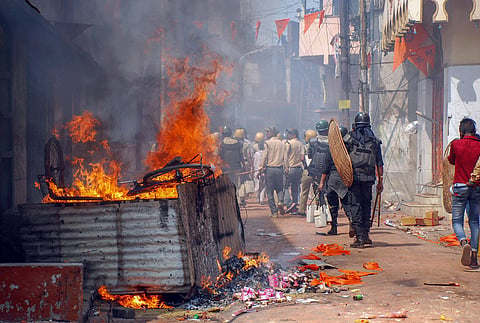Bengal riots: The triumph of good over evil isn't the same any more
A visit to Bengal during the week of Ram Navami is a very different story today

Growing up in Bengal I was not aware of the fanfare surrounding the festival of Ram Nabami. It was never a popular festival in the state, nothing compared to the autumnal festival of Durga Puja.
Faint news of the celebration came from a place called Janbazar in central Kolkata where labourers from Bihar celebrated by singing the praises of Lord Rama, a folklore hero, who fought against the demon Ravana.
There were no processions, no brandishing of arms and certainly no fanfare surrounding this festival. The industrial labour colonies of Kharagpur, Asansol, and Ranigunj in Bengal and mostly the neighbouring state of Bihar celebrated the festival and with Rama, his bows and arrows were also worshipped.
In Kolkata where I grew up, the festival spread slowly to other pockets in the city, but it was a festival always associated with the non-Bengali Hindus, a personal or closed-group activity sans the present pomp and fanfare of ‘public’ functions. At the most there was a fair ground that sold bangles for women, ribbons for little girls and bows and arrows for the boys.
A visit to Bengal during the week of Ram Nabami is a very different story today.
The festival has boiled into processions brandishing swords, street fights where the Trinamool Congress and the BJP want to prove their love for Lord Rama, social media posts fanning religious sentiments before and during the festival, a planned organized fanfare to raise the stature of Rama from a folklore hero to a God.
Earlier this week life in Raniganj and adjoining areas in West Bengal's Paschim Burdwan district was disrupted, following clashes over the recent Ram Navami rallies.
While both the Trinamool Congress and the BJP have been quick to blame each other for the unrest and disorder in the state, there is still no clear indication as to who fanned the fire. The violence has vandalized homes, shops and police vehicles.
Police have arrested 19 people so far for fomenting trouble. For many families in Bengal celebrating Ram Nabami at home, this kind of violence and display of arms by rogue groups comes as a shock. The traditionally peaceful and low-key event never invited such hostile and aggressive behavior from any religious groups or minority communities.
For these families, it has always been a silent and solemn affair, held strictly within the four walls of their home. To find that it had taken a political colour was very disheartening for them.
The people of Bengal, no matter where they came from, were always proud that the state protected their cultural and religious interests. The state gave them the space to spread their wings and voice their feelings.
Today they feel threatened even singing the praises of their hero who fought for right over wrong.
Sign up for the Daily Briefing
Get the latest news and updates straight to your inbox



